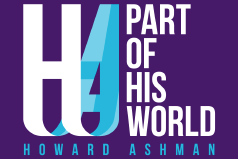Writing and Cutting
Maybe you haven’t noticed, but I’ve been struggling mightily with sustaining this blog. I don’t know if it’s writer’s block or just plain laziness but I find myself with all sorts of more important things to do lately. The fact that none of those more important things are very important is irrelevant. I’m not sure that Howard loved writing. He wasn’t one of those people who kept a lifelong diary or forced himself to sit at his desk everyday, the way many writers work. He didn’t noodle around on the typewriter or computer unless he had something to say. In fact, between projects, Howard was much more likely to be shopping, reading, cooking, entertaining or talking through ideas (some good, some great, some nuts).
Howard was really happiest when adapting material. He kind of pulled his musicals out of the source material.
I recently had a chance to sit in on a reading of the first Ashman/Menken musical, God Bless You, Mr. Rosewater. When I came home, I took a look at Kurt Vonnegut’s novel, the show’s source material. Working with Mr. Vonnegut’s full approval, Howard cut out characters, reshaped the plot line, moved scenes all over the place, and somehow wound up with a musical that is as true to the heart of that novel as it could possibly be.
Howard had a short attention span and he always said he wrote for people with short attention spans. That’s why his shows move so quickly and why they’re so tight. Writing economically isn’t the same as writing quickly or not editing your work. The trick is to find what needs to be said, say it well and stop before you lose your audience.
But Howard put a different energy into writing lyrics. The wordplay and economy of writing the words for songs fascinated him. And once he got started, he didn’t want to stop. Like working a puzzle, writing a good lyric is an intricate mind game. And it’s not enough to offer internal rhymes and brilliant wordplay, the lyric of a song for a musical also has to move the plot forward and be in character.
Still, a pro has to know when it’s time to cut. So Howard cut songs he loved. It happened in Little Shop with “We’ll Have Tomorrow.” To me, it’s the mark of a true professional; cutting out something you love from a book, a song, a show to make the whole work better. Broadway is sprinkled with the bodies of cold, dead, great songs cut in previews. It’s the stuff of legends.
As is Howard’s mighty temper. One day at Disney, when Howard wasn’t in town, three executives who shall go unnamed, decided that one of Howard’s songs was too long. So they set about cutting it. Clip, cut, slash they went, until a lowly assistant mustered up her courage. “Um, I think you should maybe let Howard do the cutting.” Good call. They did. And Arabian Nights has withstood the test of time.

